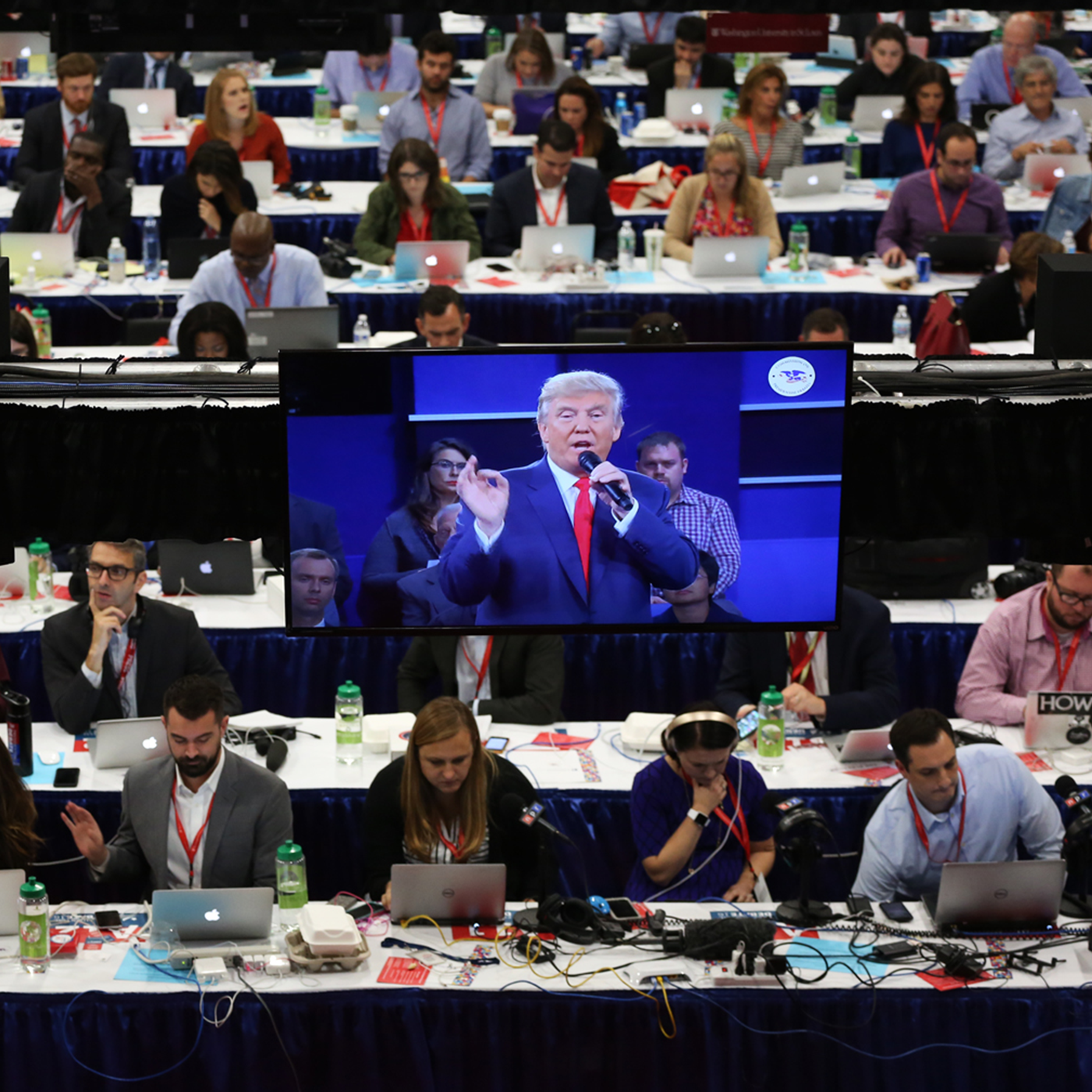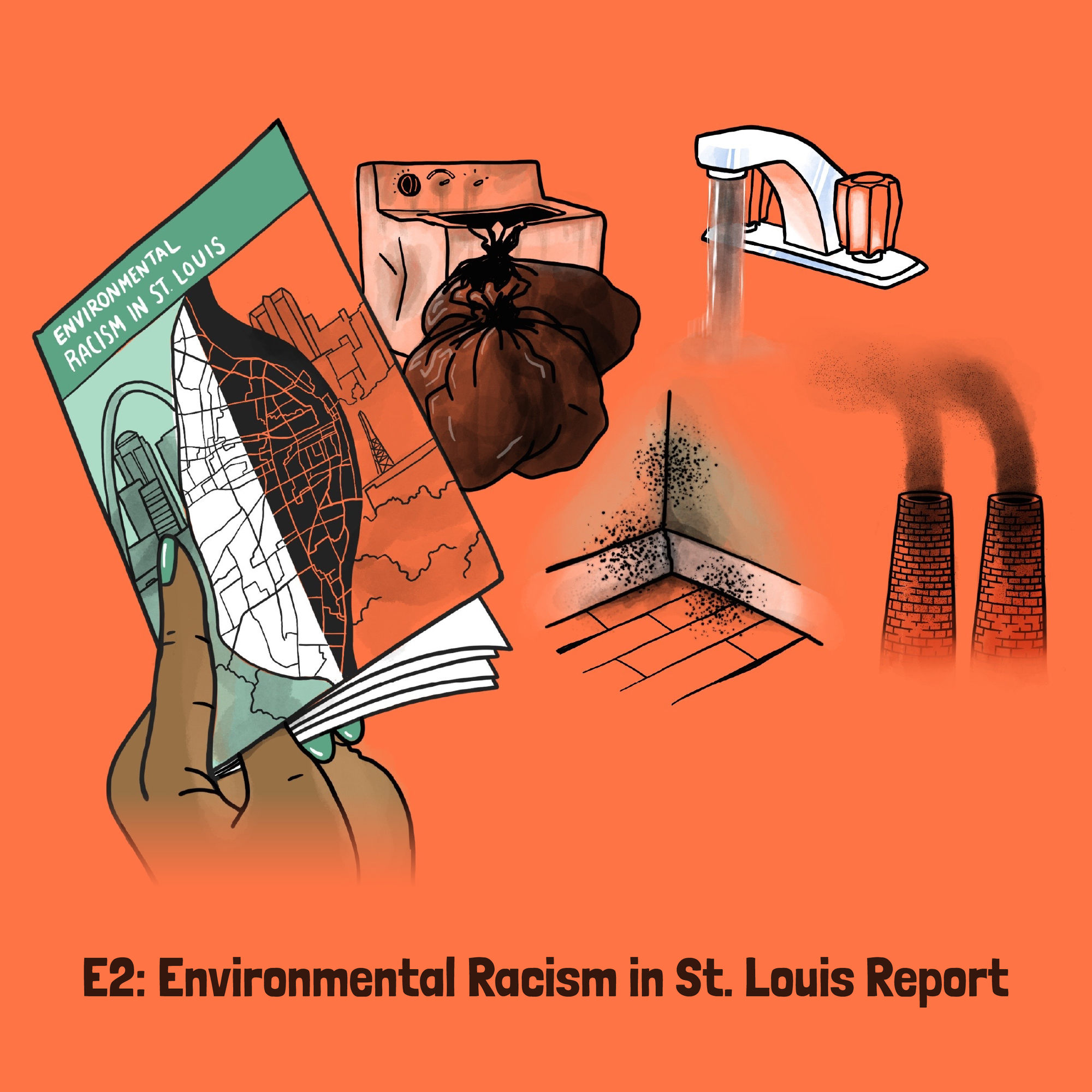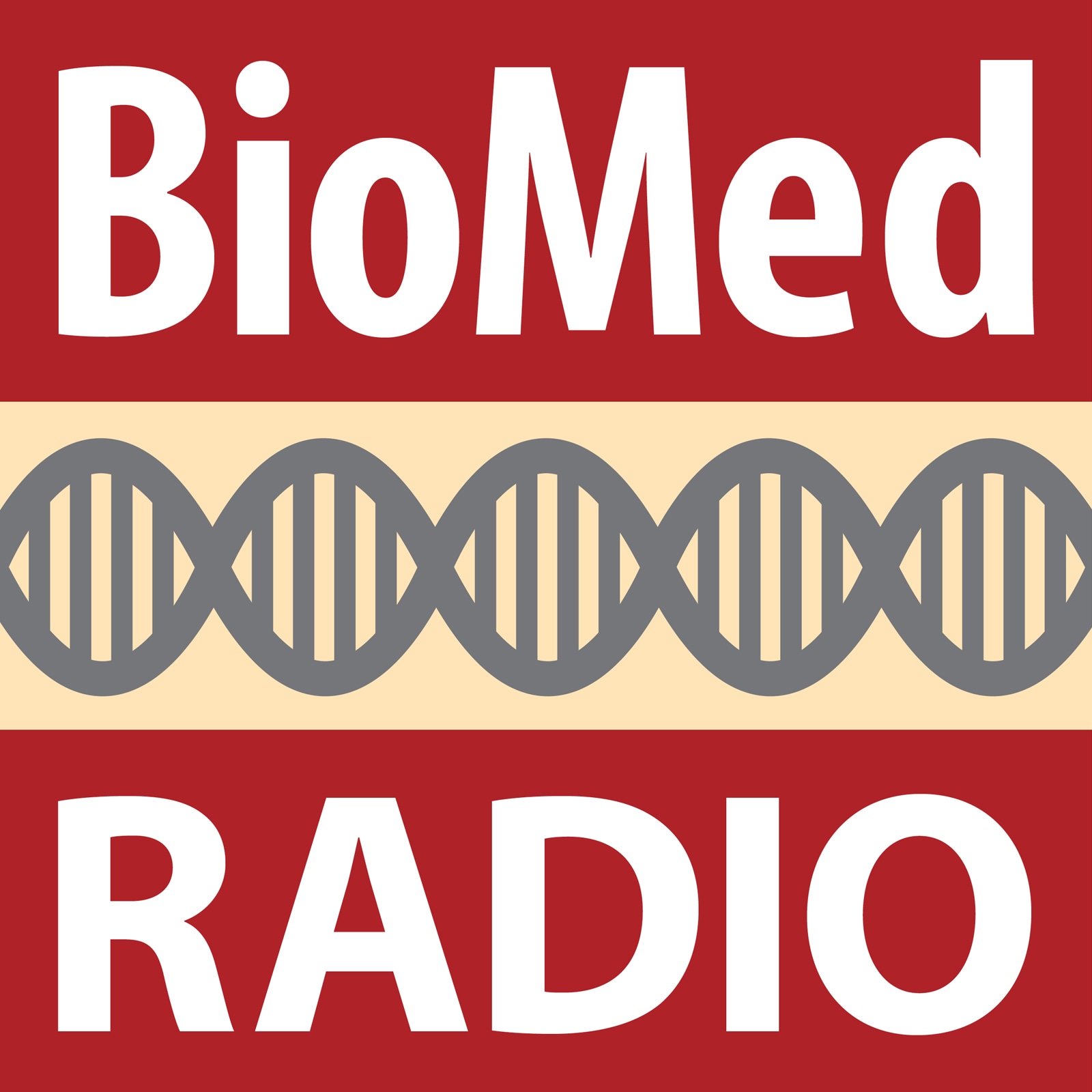Shows
 Politically SpeakingHow Trump's first 100 days made a mark on St. Louis and MissouriOn the latest episode of the Politically Speaking Hour on St. Louis on the Air, St. Louis Public Radio's Jason Rosenbaum explores how President Donald Trump's first 100 days in office affected Missouri, Illinois and the St. Louis region. Rosenbaum talks with ProPublica's Jeremy Kohler about former Missourian Ed Martin's controversial nomination as U.S. Attorney for Washington, D.C. And he also talks with Trump fans and foes, and STLPR reporters, about his first few months in office.2025-05-0250 min
Politically SpeakingHow Trump's first 100 days made a mark on St. Louis and MissouriOn the latest episode of the Politically Speaking Hour on St. Louis on the Air, St. Louis Public Radio's Jason Rosenbaum explores how President Donald Trump's first 100 days in office affected Missouri, Illinois and the St. Louis region. Rosenbaum talks with ProPublica's Jeremy Kohler about former Missourian Ed Martin's controversial nomination as U.S. Attorney for Washington, D.C. And he also talks with Trump fans and foes, and STLPR reporters, about his first few months in office.2025-05-0250 min The St. Louis PodcastSecrets & Spending - The St. Louis Podcast: Episode #100This week on The St. Louis Podcast, Eric goes solo to break down the latest government dealings, financial mysteries, and a bit of internet-fueled chaos. He dives into OpenSecrets - the platform exposing political donations, lobbying efforts, and where the money really flows in Washington. Who’s funding what, and why does it matter? Eric unpacks it all.The conversation shifts to USAID, the government agency responsible for international development and humanitarian aid. Is it truly helping, or just another black hole of taxpayer dollars? With global conflicts and shifting alliances, Eric takes a critical look at ho...2025-02-1438 min
The St. Louis PodcastSecrets & Spending - The St. Louis Podcast: Episode #100This week on The St. Louis Podcast, Eric goes solo to break down the latest government dealings, financial mysteries, and a bit of internet-fueled chaos. He dives into OpenSecrets - the platform exposing political donations, lobbying efforts, and where the money really flows in Washington. Who’s funding what, and why does it matter? Eric unpacks it all.The conversation shifts to USAID, the government agency responsible for international development and humanitarian aid. Is it truly helping, or just another black hole of taxpayer dollars? With global conflicts and shifting alliances, Eric takes a critical look at ho...2025-02-1438 min Aztecs All InAztecs All In- Washington State Postgame EditionAztecs fall to Washington State 29-26. Hosts Louis Weiner and Steve Perez share their quarter by quarter recap along with reaction and analysis plus hear from Coach Sean Lewis and players Nate Bennett and Tano Letuli.2024-10-2729 min
Aztecs All InAztecs All In- Washington State Postgame EditionAztecs fall to Washington State 29-26. Hosts Louis Weiner and Steve Perez share their quarter by quarter recap along with reaction and analysis plus hear from Coach Sean Lewis and players Nate Bennett and Tano Letuli.2024-10-2729 min Facts Or NonsenseGeorge Washington 1st U S President - S3-EP-78 | EnglishGeorge Washington 1st U S President.George Washington was an American Founding Father, politician, military officer, and farmer who served as the first president of the United States from 1789 to 1797.We appreciate your support! Tune in for fresh episodes every week. Let's keep the conversation going,join our community, subscribe and grow with us!Support the showWelcome to 'Facts Or Nonsense Podcast,' where the past, present, and future converge in a symphony of discovery. 2024-09-2501 min
Facts Or NonsenseGeorge Washington 1st U S President - S3-EP-78 | EnglishGeorge Washington 1st U S President.George Washington was an American Founding Father, politician, military officer, and farmer who served as the first president of the United States from 1789 to 1797.We appreciate your support! Tune in for fresh episodes every week. Let's keep the conversation going,join our community, subscribe and grow with us!Support the showWelcome to 'Facts Or Nonsense Podcast,' where the past, present, and future converge in a symphony of discovery. 2024-09-2501 min Politically SpeakingHow did a St. Louis school become a mainstay of the presidential debate circuit?On this week's episode of the Politically Speaking Hour on St. Louis on the Air, St. Louis Public Radio's Jason Rosenbaum talks with veteran political journalist Jo Mannies about the history of presidential debates at Washington University. Rosenbaum also talked about the upcoming presidential election with four students at MICDS. And Rosenbaum welcomes historian Cassandra Good onto the program to talk about the history of nepotism in American politics.2024-09-0649 min
Politically SpeakingHow did a St. Louis school become a mainstay of the presidential debate circuit?On this week's episode of the Politically Speaking Hour on St. Louis on the Air, St. Louis Public Radio's Jason Rosenbaum talks with veteran political journalist Jo Mannies about the history of presidential debates at Washington University. Rosenbaum also talked about the upcoming presidential election with four students at MICDS. And Rosenbaum welcomes historian Cassandra Good onto the program to talk about the history of nepotism in American politics.2024-09-0649 min Well-Developed: Bridging the gap between well-being and professional development04. Sleep Well: Exploring Healthy Sleep HabitsGuest speaker Alicia Ott joins us again to discuss all things sleep. We dive deep into strategies for rotational shift workers on how best to develop healthy sleep habits and cycles. Learn what sleep hygiene means and small steps you can take to improve your sleep so that you can learn and perform at your best. Whether you are a great sleeper, a terrible sleeper, a new parent, or a night shift worker, we have tips to help anyone find better sleep.2023-11-0937 min
Well-Developed: Bridging the gap between well-being and professional development04. Sleep Well: Exploring Healthy Sleep HabitsGuest speaker Alicia Ott joins us again to discuss all things sleep. We dive deep into strategies for rotational shift workers on how best to develop healthy sleep habits and cycles. Learn what sleep hygiene means and small steps you can take to improve your sleep so that you can learn and perform at your best. Whether you are a great sleeper, a terrible sleeper, a new parent, or a night shift worker, we have tips to help anyone find better sleep.2023-11-0937 min Notable People in HistoryEp. 92 Martha Washington: Wife of American Founding Father George WashingtonIn this week's Notable People in History podcast, we’ll take a look at the life of Martha Washington, the first First Lady. As first lady, she initiated a weekly reception, held on Friday evenings hosting members of Congress, visiting dignitaries, and men and women from the local community.2023-10-2103 min
Notable People in HistoryEp. 92 Martha Washington: Wife of American Founding Father George WashingtonIn this week's Notable People in History podcast, we’ll take a look at the life of Martha Washington, the first First Lady. As first lady, she initiated a weekly reception, held on Friday evenings hosting members of Congress, visiting dignitaries, and men and women from the local community.2023-10-2103 min Notable People in HistoryEp. 89 George Washington: Farmer & First President of the United States
In this week's Notable People in History podcast, we’ll take a look at the life of American Founding Father, George Washington. He was the first American president, commander of the Continental Army, president of the Constitutional Convention, and a farmer. 2023-09-3004 min
Notable People in HistoryEp. 89 George Washington: Farmer & First President of the United States
In this week's Notable People in History podcast, we’ll take a look at the life of American Founding Father, George Washington. He was the first American president, commander of the Continental Army, president of the Constitutional Convention, and a farmer. 2023-09-3004 min Well-Developed: Bridging the gap between well-being and professional development03. Exploring BoundariesJoin guest speaker Alicia Ott, a licensed therapist at Washington University in St. Louis, to explore boundaries and why they are so important for well-being and professional growth. Learn how to best respect, evaluate, and set boundaries for yourself at work and in your personal life!2023-09-0839 min
Well-Developed: Bridging the gap between well-being and professional development03. Exploring BoundariesJoin guest speaker Alicia Ott, a licensed therapist at Washington University in St. Louis, to explore boundaries and why they are so important for well-being and professional growth. Learn how to best respect, evaluate, and set boundaries for yourself at work and in your personal life!2023-09-0839 min Well-Developed: Bridging the gap between well-being and professional development01. Introversion, Extroversion & YouExplore where you fall on the introvert/extrovert spectrum and how you can best capitalize on those traits personally, professionally, and on teams. Understand the unique ways your brain works and how understanding how you “tick” leads to better well-being!2023-09-0655 min
Well-Developed: Bridging the gap between well-being and professional development01. Introversion, Extroversion & YouExplore where you fall on the introvert/extrovert spectrum and how you can best capitalize on those traits personally, professionally, and on teams. Understand the unique ways your brain works and how understanding how you “tick” leads to better well-being!2023-09-0655 min Washington Post LiveJulia Louis-Dreyfus and Tobias Menzies on new film ‘You Hurt My Feelings’Washington Post chief film critic Ann Hornaday speaks with award-winning actors Julia Louis-Dreyfus and Tobias Menzies join Washington Post Live to discuss their new film, “You Hurt My Feelings,” and what it was like to play a long-married couple facing relationship issues.
Conversation recorded on Monday, May 22, 2023.2023-05-2218 min
Washington Post LiveJulia Louis-Dreyfus and Tobias Menzies on new film ‘You Hurt My Feelings’Washington Post chief film critic Ann Hornaday speaks with award-winning actors Julia Louis-Dreyfus and Tobias Menzies join Washington Post Live to discuss their new film, “You Hurt My Feelings,” and what it was like to play a long-married couple facing relationship issues.
Conversation recorded on Monday, May 22, 2023.2023-05-2218 min Under The ArchS3 Bonus Episode: Getting Out the Vote feat. Kerry WashingtonArchCity Defenders and Action St. Louis present the premiere collaborative podcast, "Under The Arch." Your hosts Blake Strode, Executive Director of ArchCity Defenders, and Kayla Reed, Director of Action St. Louis, explore the issues facing our community and the people working to transform them.The 2022 midterms are quickly approaching and the stakes have never been higher. Join us for a special “election edition” of Under The Arch, where we discuss the ballot in Missouri. We are joined by actress and activist Kerry Washington to discuss the stakes of this upcoming election and why she is working to ensu...2022-11-0440 min
Under The ArchS3 Bonus Episode: Getting Out the Vote feat. Kerry WashingtonArchCity Defenders and Action St. Louis present the premiere collaborative podcast, "Under The Arch." Your hosts Blake Strode, Executive Director of ArchCity Defenders, and Kayla Reed, Director of Action St. Louis, explore the issues facing our community and the people working to transform them.The 2022 midterms are quickly approaching and the stakes have never been higher. Join us for a special “election edition” of Under The Arch, where we discuss the ballot in Missouri. We are joined by actress and activist Kerry Washington to discuss the stakes of this upcoming election and why she is working to ensu...2022-11-0440 min Love thy LawyerSeth Steward - George Washington UniversitySend us a textlovethylawyer.comA transcript of this podcast is available at lovethylawyer.com.Go to https://www.lovethylawyer.com/blog for transcripts.LTL - Seth Steward - Show Notes lovethylawyer.com A transcript of this podcast is easily available at lovethylawyer.com. Seth Steward’s interesting career involves being a rescue helicopter pilot for the United States Air Force, being the chief of staff for a member of the Oakland City Council, and serving in the San F...2022-04-2735 min
Love thy LawyerSeth Steward - George Washington UniversitySend us a textlovethylawyer.comA transcript of this podcast is available at lovethylawyer.com.Go to https://www.lovethylawyer.com/blog for transcripts.LTL - Seth Steward - Show Notes lovethylawyer.com A transcript of this podcast is easily available at lovethylawyer.com. Seth Steward’s interesting career involves being a rescue helicopter pilot for the United States Air Force, being the chief of staff for a member of the Oakland City Council, and serving in the San F...2022-04-2735 min Washington Post LiveTishaura Jones on St. Louis's 2021 drop in homicides and the role of policingWashington Post criminal justice reporter Tom Jackman speaks with St. Louis Mayor Tishaura Jones about her city’s 26 percent drop in homicides in 2021, the role of policing and navigating the coronavirus pandemic.2022-02-0124 min
Washington Post LiveTishaura Jones on St. Louis's 2021 drop in homicides and the role of policingWashington Post criminal justice reporter Tom Jackman speaks with St. Louis Mayor Tishaura Jones about her city’s 26 percent drop in homicides in 2021, the role of policing and navigating the coronavirus pandemic.2022-02-0124 min Love thy LawyerHon. Scott Jackson (ACBA) - George WashingtonSend us a textlovethylawyer.comA transcript of this podcast is easily available at lovethylawyer.com.Go to https://www.lovethylawyer.com/blog for transcripts.In collaboration with the Alameda County Bar Association, Love Thy Lawyer presents an interview with: Hon. Scott Jackson, Alameda County Superior Courthttp://www.alameda.courts.ca.gov/pages.aspx/juvenileAlameda County Bar AssociationThe Alameda County Bar Association (ACBA) is...2021-12-0832 min
Love thy LawyerHon. Scott Jackson (ACBA) - George WashingtonSend us a textlovethylawyer.comA transcript of this podcast is easily available at lovethylawyer.com.Go to https://www.lovethylawyer.com/blog for transcripts.In collaboration with the Alameda County Bar Association, Love Thy Lawyer presents an interview with: Hon. Scott Jackson, Alameda County Superior Courthttp://www.alameda.courts.ca.gov/pages.aspx/juvenileAlameda County Bar AssociationThe Alameda County Bar Association (ACBA) is...2021-12-0832 min Love thy LawyerBruce Kapsack - WashingtonSend us a textlovethylawyer.comA transcript of this podcast is easily available at lovethylawyer.com.Go to https://www.lovethylawyer.com/blog for transcripts.Bruce KapsackPublic Defender - Truckee, CAhttps://www.mynevadacounty.com/573/Public-Defender Bruce Kapsack received his BA from Plymouth State College in 1984 and his JD from American University Washington College of Law in 1987. While at WCL, Bruce was hand picked to write, and then argue, an Education for All Handicapped Children Act case before the USCA 4t...2021-11-1028 min
Love thy LawyerBruce Kapsack - WashingtonSend us a textlovethylawyer.comA transcript of this podcast is easily available at lovethylawyer.com.Go to https://www.lovethylawyer.com/blog for transcripts.Bruce KapsackPublic Defender - Truckee, CAhttps://www.mynevadacounty.com/573/Public-Defender Bruce Kapsack received his BA from Plymouth State College in 1984 and his JD from American University Washington College of Law in 1987. While at WCL, Bruce was hand picked to write, and then argue, an Education for All Handicapped Children Act case before the USCA 4t...2021-11-1028 min Radio ResistanceCollective Healing with Guadalupe Maravilla and Dr. LJ PunchWhat it would mean to reset our understanding of health and well-being as an entire community, especially now? In this episode, artist Guadalupe Maravilla and trauma surgeon Dr. LJ Punch speak to the effects of untreated, unhealed trauma in the body. They explore deep connections between the body and the mind, between physical and spiritual realities, and the power of ancient and traditional medicinal practices from across the world. Ultimately, they advocate for the importance of bringing healthcare to the community and offering people better access to alternative ways of healing.Guadalupe Maravilla is a...2021-06-0336 min
Radio ResistanceCollective Healing with Guadalupe Maravilla and Dr. LJ PunchWhat it would mean to reset our understanding of health and well-being as an entire community, especially now? In this episode, artist Guadalupe Maravilla and trauma surgeon Dr. LJ Punch speak to the effects of untreated, unhealed trauma in the body. They explore deep connections between the body and the mind, between physical and spiritual realities, and the power of ancient and traditional medicinal practices from across the world. Ultimately, they advocate for the importance of bringing healthcare to the community and offering people better access to alternative ways of healing.Guadalupe Maravilla is a...2021-06-0336 min John Brown TodayLetters and Friends: A Zoom Conversation with Margaret Washington!Send us a textIn the first installment of a feature called "Letters and Friends," Lou meets (via zoom) with the wonderful scholar and author, Margaret Washington of Cornell University, author of a number of important works, especially Sojourner Truth's America (2009). The conversation, built around a letter by John Brown to his wife, Mary, in January 1858 (transcribed in abbreviated form below because of space restrictions), reflects upon Brown, Douglass, as well as some interesting insights on Sojourner Truth. Listeners will enjoy getting to know a little about Margaret, her insights into the antebellum era abolitionist movement, and h...2021-03-2750 min
John Brown TodayLetters and Friends: A Zoom Conversation with Margaret Washington!Send us a textIn the first installment of a feature called "Letters and Friends," Lou meets (via zoom) with the wonderful scholar and author, Margaret Washington of Cornell University, author of a number of important works, especially Sojourner Truth's America (2009). The conversation, built around a letter by John Brown to his wife, Mary, in January 1858 (transcribed in abbreviated form below because of space restrictions), reflects upon Brown, Douglass, as well as some interesting insights on Sojourner Truth. Listeners will enjoy getting to know a little about Margaret, her insights into the antebellum era abolitionist movement, and h...2021-03-2750 min We Live HereEnvironmental Racism in St. Louis ReportIn St. Louis, there are many stories about how environmental racism impacts everyday people and their health, housing, and daily lives. So in this season, we’ll use the Washington University Interdisciplinary Environmental Law Clinic’s 2019 report on Environmental Racism in St. Louis to guide us through conversations about the top environmental issues facing the most vulnerable communities in St. Louis. In this episode, we look back at how St. Louis’ history of systemic racism has impacted the living environments of low-income and Black residents, how the report featured stories of everyday people, and what type of environment the report’s recomm...2021-02-2641 min
We Live HereEnvironmental Racism in St. Louis ReportIn St. Louis, there are many stories about how environmental racism impacts everyday people and their health, housing, and daily lives. So in this season, we’ll use the Washington University Interdisciplinary Environmental Law Clinic’s 2019 report on Environmental Racism in St. Louis to guide us through conversations about the top environmental issues facing the most vulnerable communities in St. Louis. In this episode, we look back at how St. Louis’ history of systemic racism has impacted the living environments of low-income and Black residents, how the report featured stories of everyday people, and what type of environment the report’s recomm...2021-02-2641 min The Drs. Washington PodcastThe Roots: Louis Tompkins WrightWelcome to the Black History Month edition of The Drs. Washington Podcast where we highlight African Americans who have made significant contributions to the field of medicine. This episode features the life and achievements of Dr. Louis Tomkins Wright, the first Black physician on staff at a non-segregated hospital. Music is from single “Alright” by Mississippi-native, Mike Burton on his album Soulful. All rights reserved. Available on iTunes. Our views are our own and do not represent those of our employers. The content is not intended to be a substitute for professional medical advice, di...2021-02-0607 min
The Drs. Washington PodcastThe Roots: Louis Tompkins WrightWelcome to the Black History Month edition of The Drs. Washington Podcast where we highlight African Americans who have made significant contributions to the field of medicine. This episode features the life and achievements of Dr. Louis Tomkins Wright, the first Black physician on staff at a non-segregated hospital. Music is from single “Alright” by Mississippi-native, Mike Burton on his album Soulful. All rights reserved. Available on iTunes. Our views are our own and do not represent those of our employers. The content is not intended to be a substitute for professional medical advice, di...2021-02-0607 min Craft TalksCraft Talks at Saint Louis University: A Conversation with Creative Nonfiction Writer & Washington University Professor, Edward McPhersonEdward McPherson, associate professor of English at Washington University in St. Louis, is the author of three books: Buster Keaton: Tempest in a Flat Hat (Faber & Faber), The Backwash Squeeze and Other Improbable Feats (HarperCollins), and The History of the Future: American Essays (Coffee House Press). He has written for the New York Times Magazine, the Paris Review, the American Scholar, the Gettysburg Review, Salon, Guernica, the Southern Review, and the New York Observer, among many others. Edward McPherson has received numerous awards and recognitions, including a Pushcart Prize, the PEN Southwest Book Award, the Gulf Coast Prize in...2021-01-1854 min
Craft TalksCraft Talks at Saint Louis University: A Conversation with Creative Nonfiction Writer & Washington University Professor, Edward McPhersonEdward McPherson, associate professor of English at Washington University in St. Louis, is the author of three books: Buster Keaton: Tempest in a Flat Hat (Faber & Faber), The Backwash Squeeze and Other Improbable Feats (HarperCollins), and The History of the Future: American Essays (Coffee House Press). He has written for the New York Times Magazine, the Paris Review, the American Scholar, the Gettysburg Review, Salon, Guernica, the Southern Review, and the New York Observer, among many others. Edward McPherson has received numerous awards and recognitions, including a Pushcart Prize, the PEN Southwest Book Award, the Gulf Coast Prize in...2021-01-1854 min Love thy LawyerOtis Landerholm - Washington State (Cougars)Send us a textlovethylawyer.comA transcript of this podcast is easily available at lovethylawyer.com.Go to Blog for transcript lists.https://www.landerholmimmigration.com/Otis is the founding partner of a full-service immigration law firm based in Oakland, California. He relishes helping people through some of the most difficult periods of their lives. He speaks Mandarin and Spanish in addition to English. He is also the host of the Empowered Immigrant Podcast. He is a tireless cheerleader for his team of 20 professionals, and th...2020-12-0928 min
Love thy LawyerOtis Landerholm - Washington State (Cougars)Send us a textlovethylawyer.comA transcript of this podcast is easily available at lovethylawyer.com.Go to Blog for transcript lists.https://www.landerholmimmigration.com/Otis is the founding partner of a full-service immigration law firm based in Oakland, California. He relishes helping people through some of the most difficult periods of their lives. He speaks Mandarin and Spanish in addition to English. He is also the host of the Empowered Immigrant Podcast. He is a tireless cheerleader for his team of 20 professionals, and th...2020-12-0928 min Raised on RhythmEpisode 8: Leigh Bezezekoff & Michael Gill (Washington Nightlife Music Association)In this episode I talk with 2 heavy-hitters in Seattle's live music industry -
Leigh Bezezekoff began her career in 2007, going on to work as an artist manager, promoter, and talent buyer. She's currently part of the team at Seattle's Tractor Tavern. Leigh's also done production work for area festivals including Bumbershoot.
Michael Gill is the talent buyer for Central Saloon, in addition to fronting his own band, [ b r a c k e t s ].
Michael and Leigh discuss their newfound roles advocating for live music as part of the Washington Nightlife Music Association (WNMA). We also discuss the challenges of...2020-10-2852 min
Raised on RhythmEpisode 8: Leigh Bezezekoff & Michael Gill (Washington Nightlife Music Association)In this episode I talk with 2 heavy-hitters in Seattle's live music industry -
Leigh Bezezekoff began her career in 2007, going on to work as an artist manager, promoter, and talent buyer. She's currently part of the team at Seattle's Tractor Tavern. Leigh's also done production work for area festivals including Bumbershoot.
Michael Gill is the talent buyer for Central Saloon, in addition to fronting his own band, [ b r a c k e t s ].
Michael and Leigh discuss their newfound roles advocating for live music as part of the Washington Nightlife Music Association (WNMA). We also discuss the challenges of...2020-10-2852 min Informal History PodcastEpisode 3: From Charlotte Rumbold to Mabel Curtis, An examination of "the Lung Block,"on St. Louis' Near NorthsideWashington University Adjunct Professor Taylor Desloge joins podcast host Mark Loehrer to continue the conversation around public health in St. Louis, with a focused historical look towards the near-northside--specifically Carr Square. There, in the densely packed tenements of St. Louis at the turn of the century, progressive reformer Charlotte Rumbold uncovered the truth about St. Louis' looming public health crisis. Desloge's work on St. Louis' "Lung Block" is the subject of this conversation as well as his published dissertation, "The Tortured Pre-History of Urban Blight: African American St. Louis and the Politics of Public Health, 1877-1940"https://digital...2020-05-0649 min
Informal History PodcastEpisode 3: From Charlotte Rumbold to Mabel Curtis, An examination of "the Lung Block,"on St. Louis' Near NorthsideWashington University Adjunct Professor Taylor Desloge joins podcast host Mark Loehrer to continue the conversation around public health in St. Louis, with a focused historical look towards the near-northside--specifically Carr Square. There, in the densely packed tenements of St. Louis at the turn of the century, progressive reformer Charlotte Rumbold uncovered the truth about St. Louis' looming public health crisis. Desloge's work on St. Louis' "Lung Block" is the subject of this conversation as well as his published dissertation, "The Tortured Pre-History of Urban Blight: African American St. Louis and the Politics of Public Health, 1877-1940"https://digital...2020-05-0649 min Under The ArchS2 Ep. 5 COVID-19 in St. Louis ft. Dr. Jason PurnellArchCity Defenders and Action St. Louis present the premiere collaborative podcast, "Under The Arch." Your hosts Blake Strode, Executive Director of ArchCity Defenders, and Kayla Reed, Director of Action St. Louis, explore the issues facing our community and the people working to transform them.This special episode features returning guest Dr. Jason Purnell, Director of Health Equity Works (formerly For The Sake of All) and associate professor in the Brown School at Washington University in St. Louis in a discussion about the COVID-19 pandemic as it's happening in St. Louis, racial health disparities, and regional response efforts...2020-04-281h 08
Under The ArchS2 Ep. 5 COVID-19 in St. Louis ft. Dr. Jason PurnellArchCity Defenders and Action St. Louis present the premiere collaborative podcast, "Under The Arch." Your hosts Blake Strode, Executive Director of ArchCity Defenders, and Kayla Reed, Director of Action St. Louis, explore the issues facing our community and the people working to transform them.This special episode features returning guest Dr. Jason Purnell, Director of Health Equity Works (formerly For The Sake of All) and associate professor in the Brown School at Washington University in St. Louis in a discussion about the COVID-19 pandemic as it's happening in St. Louis, racial health disparities, and regional response efforts...2020-04-281h 08 Informal History PodcastEpisode 00: Author/Historian Walter Johnson & St. Louis Civil Rights Icon Percy GreenHistorian Walter Johnson, author of "The Broken Heart of America: St. Louis and the Violent History of the United States," joins local civil rights icon, Percy Green, founder of ACTION and the man who climbed the arch--to talk about a range of issues pertinent to Johnson's new book including racism, labor organizing and civil rights activism. The interview was conducted with two hosts from the Informal History editorial board, Umar Lee, veteran podcaster and St. Louis activist and Miranda Rectenwald, historian and archivist at Washington University.2020-04-231h 01
Informal History PodcastEpisode 00: Author/Historian Walter Johnson & St. Louis Civil Rights Icon Percy GreenHistorian Walter Johnson, author of "The Broken Heart of America: St. Louis and the Violent History of the United States," joins local civil rights icon, Percy Green, founder of ACTION and the man who climbed the arch--to talk about a range of issues pertinent to Johnson's new book including racism, labor organizing and civil rights activism. The interview was conducted with two hosts from the Informal History editorial board, Umar Lee, veteran podcaster and St. Louis activist and Miranda Rectenwald, historian and archivist at Washington University.2020-04-231h 01 Stacy on the RightEpisode 618: Why is aggressive homelessness suddenly such an issue?Because Democrats are waging a nationwide campaign to make homelessness the norm. If it's normal and expected, then we cannot hold them accountable for running most of the areas plagued by joblessness and homelessness.
Donate to support the show here: paypal.me/stacyontheright
Or join our Patreon: patreon.com/stacyontheright
Thanks and God Bless ya!!
-- Spiritual Encouragement --
I stand at the door and knock, if anyone hears My voice and opens the door, I will come in to him.
Revelation 3:20
-- Stacy's Stash! --
...2020-01-3037 min
Stacy on the RightEpisode 618: Why is aggressive homelessness suddenly such an issue?Because Democrats are waging a nationwide campaign to make homelessness the norm. If it's normal and expected, then we cannot hold them accountable for running most of the areas plagued by joblessness and homelessness.
Donate to support the show here: paypal.me/stacyontheright
Or join our Patreon: patreon.com/stacyontheright
Thanks and God Bless ya!!
-- Spiritual Encouragement --
I stand at the door and knock, if anyone hears My voice and opens the door, I will come in to him.
Revelation 3:20
-- Stacy's Stash! --
...2020-01-3037 min Stacy on the RightEpisode 616: BONUS!! Dems push to eliminate laws against Vagrancy - this time in St. Louis County!This is my interview on FM News Talk 97.1 in St. Louis about the vagrancy law issue the St. Louis County Council is considering!
Instead of eliminating laws that protect citizens against aggressive panhandling and violence, Democrats seek to eliminate the laws in favor of "decriminalizing poverty." Give me a break. This is just more nonsense!!
Donate to support the show here: paypal.me/stacyontheright
Or join our Patreon: patreon.com/stacyontheright
Thanks and God Bless ya!!
-- Spiritual Encouragement --
Since He Himself was tempted,... He is able to come...2020-01-2908 min
Stacy on the RightEpisode 616: BONUS!! Dems push to eliminate laws against Vagrancy - this time in St. Louis County!This is my interview on FM News Talk 97.1 in St. Louis about the vagrancy law issue the St. Louis County Council is considering!
Instead of eliminating laws that protect citizens against aggressive panhandling and violence, Democrats seek to eliminate the laws in favor of "decriminalizing poverty." Give me a break. This is just more nonsense!!
Donate to support the show here: paypal.me/stacyontheright
Or join our Patreon: patreon.com/stacyontheright
Thanks and God Bless ya!!
-- Spiritual Encouragement --
Since He Himself was tempted,... He is able to come...2020-01-2908 min Told It Here!: 25 Iconic Years of Washington Capitals Hockey with Joe Beninati and Craig LaughlinCaps Spoil Banner Night in St. LouisRob, Jenks, and J.J. dissect the OT win in St. Louis to open up the season, including Alex Ovechkin starting off the year with a goal. They close by previewing Friday night's game at Barry Trotz and the Islanders (29:54).See Privacy Policy at https://art19.com/privacy and California Privacy Notice at https://art19.com/privacy#do-not-sell-my-info.2019-10-0438 min
Told It Here!: 25 Iconic Years of Washington Capitals Hockey with Joe Beninati and Craig LaughlinCaps Spoil Banner Night in St. LouisRob, Jenks, and J.J. dissect the OT win in St. Louis to open up the season, including Alex Ovechkin starting off the year with a goal. They close by previewing Friday night's game at Barry Trotz and the Islanders (29:54).See Privacy Policy at https://art19.com/privacy and California Privacy Notice at https://art19.com/privacy#do-not-sell-my-info.2019-10-0438 min Stacy on the RightEpisode 557: Dave Glover Think Tank: Stacy Washington, Mike Elam and Megan McBrideIt's always fun to join Dave on his weekly roundtable to discuss politics and culture!! We often discuss local St. Louis issues but today was all about black face, Canadian President Justin Trudeau and the Democrats 2020 Presidential campaign.
We would love to hear from you! Our mailing address is
Stacy Washington
167 Lamp and Lantern Village
211
Chesterfield MO 63017
God Bless --- have a fantastic weekend!!
Stacy
-- Stacy's Stash! --
For links to the articles and material referenced in this week's episode check...2019-09-2748 min
Stacy on the RightEpisode 557: Dave Glover Think Tank: Stacy Washington, Mike Elam and Megan McBrideIt's always fun to join Dave on his weekly roundtable to discuss politics and culture!! We often discuss local St. Louis issues but today was all about black face, Canadian President Justin Trudeau and the Democrats 2020 Presidential campaign.
We would love to hear from you! Our mailing address is
Stacy Washington
167 Lamp and Lantern Village
211
Chesterfield MO 63017
God Bless --- have a fantastic weekend!!
Stacy
-- Stacy's Stash! --
For links to the articles and material referenced in this week's episode check...2019-09-2748 min Stacy on the RightEpisode 511: SOTR Hosts Encounter on St. Louis's BOTT Radio NetworkI had the opportunity to guest host Encounter on BOTT Radio St. Louis 1320AM. What an honor!! They have me scheduled to guest host again, looking forward to that!
-- Stacy's Stash! --
For links to the articles and material referenced in this week's episode check out this week's page from our podcast dashboard!
-- Get More Stacy --
Stacy's Blog
Watch the show live, download previous episodes, and more Stacy!
Contact Stacy
stacy [at] stacyontheright.com
-- Connect with Stacy --
2019-07-1911 min
Stacy on the RightEpisode 511: SOTR Hosts Encounter on St. Louis's BOTT Radio NetworkI had the opportunity to guest host Encounter on BOTT Radio St. Louis 1320AM. What an honor!! They have me scheduled to guest host again, looking forward to that!
-- Stacy's Stash! --
For links to the articles and material referenced in this week's episode check out this week's page from our podcast dashboard!
-- Get More Stacy --
Stacy's Blog
Watch the show live, download previous episodes, and more Stacy!
Contact Stacy
stacy [at] stacyontheright.com
-- Connect with Stacy --
2019-07-1911 min Meet St. LouisEpisode 4: Humans of St. Louis' Lindy DrewHumans of St. Louis shares the people of our city, one photo and story at a time. It started as a side project for a group of friends at Washington University and sparked a movement. With a camera in hand, Lindy Drew travels the city of St. Louis by bicycle to share the stories of St. Louisians. She explains how she views St. Louis through each individuals story and hopes their work will help others learn more about our unique city. They are also crowdfunding to create the first Humans of St. Louis book.
https://www.kickstarter.com/projects/1722661240/humans-of-st-louis-the-book2018-07-2343 min
Meet St. LouisEpisode 4: Humans of St. Louis' Lindy DrewHumans of St. Louis shares the people of our city, one photo and story at a time. It started as a side project for a group of friends at Washington University and sparked a movement. With a camera in hand, Lindy Drew travels the city of St. Louis by bicycle to share the stories of St. Louisians. She explains how she views St. Louis through each individuals story and hopes their work will help others learn more about our unique city. They are also crowdfunding to create the first Humans of St. Louis book.
https://www.kickstarter.com/projects/1722661240/humans-of-st-louis-the-book2018-07-2343 min Louis FutonLouis Futon - Restless Sea (feat. Opia)I’ve been a fan of Opia for a long time and met DJ and Cole when I moved out to LA. I wanted to combine both of our sounds to make something big. This song turned out to be a personal favorite of mine, I’m a sucker for massive guitar riffs though. 🌹
Stream/Download: http://foreignf.am/restless-sea
Follow Louis Futon
facebook: https://louisfuton.ffm.to/facebook
instagram: https://louisfuton.ffm.to/instagram
twitter: https://louisfuton.ffm.to/twitter
soundcloud: https://louisfuton.ffm.to/soundcloud
apple music :https://louisfuton.ffm.to/applemusic
spotify: https://louisfuton.ffm.to/spotify
website...2017-11-1603 min
Louis FutonLouis Futon - Restless Sea (feat. Opia)I’ve been a fan of Opia for a long time and met DJ and Cole when I moved out to LA. I wanted to combine both of our sounds to make something big. This song turned out to be a personal favorite of mine, I’m a sucker for massive guitar riffs though. 🌹
Stream/Download: http://foreignf.am/restless-sea
Follow Louis Futon
facebook: https://louisfuton.ffm.to/facebook
instagram: https://louisfuton.ffm.to/instagram
twitter: https://louisfuton.ffm.to/twitter
soundcloud: https://louisfuton.ffm.to/soundcloud
apple music :https://louisfuton.ffm.to/applemusic
spotify: https://louisfuton.ffm.to/spotify
website...2017-11-1603 min BioMed Radio - Washington University School of Medicine in St. LouisSex differences contribute to vision damage in NF1BOYS AND GIRLS WITH MUTATIONS IN A GENE CALLED NF1 TEND TO DEVELOP TUMORS, AND THEY HAVE A SIGNIFICANT RISK OF DEVELOPING THEM ON THE OPTIC NERVE. BUT IT TURNS OUT THAT GIRLS ARE MUCH MORE LIKELY TO HAVE VISION PROBLEMS AS A RESULT OF THOSE TUMORS. NOW, RESEARCHERS AT WASHINGTON UNIVERSITY SCHOOL OF MEDICINE IN ST. LOUIS HAVE FOUND THAT THE FEMALE HORMONE ESTROGEN PLAYS A ROLE IN THAT DIFFERENCE BETWEEN BOYS AND GIRLS BY REVVING UP IMMUNE CELLS THAT DAMAGE THE OPTIC NERVE, LEADING TO VISION LOSS. JIM DRYDEN HAS THE STORY…2016-12-1300 min
BioMed Radio - Washington University School of Medicine in St. LouisSex differences contribute to vision damage in NF1BOYS AND GIRLS WITH MUTATIONS IN A GENE CALLED NF1 TEND TO DEVELOP TUMORS, AND THEY HAVE A SIGNIFICANT RISK OF DEVELOPING THEM ON THE OPTIC NERVE. BUT IT TURNS OUT THAT GIRLS ARE MUCH MORE LIKELY TO HAVE VISION PROBLEMS AS A RESULT OF THOSE TUMORS. NOW, RESEARCHERS AT WASHINGTON UNIVERSITY SCHOOL OF MEDICINE IN ST. LOUIS HAVE FOUND THAT THE FEMALE HORMONE ESTROGEN PLAYS A ROLE IN THAT DIFFERENCE BETWEEN BOYS AND GIRLS BY REVVING UP IMMUNE CELLS THAT DAMAGE THE OPTIC NERVE, LEADING TO VISION LOSS. JIM DRYDEN HAS THE STORY…2016-12-1300 min BioMed Radio - Washington University School of Medicine in St. LouisBrain changes in Tourette syndromeUsing MRIs, researchers at Washington University School of Medicine in St. Louis have identified areas in the brains of children with Tourettes syndrome that appear markedly different from the same areas in the brains of children who dont have the neuropsychiatric disorder.2016-10-2500 min
BioMed Radio - Washington University School of Medicine in St. LouisBrain changes in Tourette syndromeUsing MRIs, researchers at Washington University School of Medicine in St. Louis have identified areas in the brains of children with Tourettes syndrome that appear markedly different from the same areas in the brains of children who dont have the neuropsychiatric disorder.2016-10-2500 min BioMed Radio - Washington University School of Medicine in St. LouisBruchas-BRAIN grantAs part of the White House Brain Initiative, researchers at Washington University School of Medicine in St. Louis have received two grants to develop tools to map and activate pathways in the brain with light. With $3.8 million in funding from the National Institutes of Health (NIH), the researchers, with collaborators at the University of California, San Diego School of Medicine and the University of Illinois at Urbana-Champaign, will study how light-sensitive proteins can be used to control specific brain circuits with the goal of understanding how the brain is wired to regulate behaviors, such as stress, anxiety and depression.2016-10-1200 min
BioMed Radio - Washington University School of Medicine in St. LouisBruchas-BRAIN grantAs part of the White House Brain Initiative, researchers at Washington University School of Medicine in St. Louis have received two grants to develop tools to map and activate pathways in the brain with light. With $3.8 million in funding from the National Institutes of Health (NIH), the researchers, with collaborators at the University of California, San Diego School of Medicine and the University of Illinois at Urbana-Champaign, will study how light-sensitive proteins can be used to control specific brain circuits with the goal of understanding how the brain is wired to regulate behaviors, such as stress, anxiety and depression.2016-10-1200 min BioMed Radio - Washington University School of Medicine in St. LouisPCORI depression grantTreatment-resistant depression is a big problem for older adults. More than half of seniors with clinical depression dont get relief from standard antidepressant medications. To address that problem, psychiatrists at Washington University School of Medicine in St. Louis are helming a multicenter study to evaluate the efficacy of supplementing current therapies with additional drugs, or changing medications altogether. The study will follow 1,500 people with depression from St. Louis and rural Missouri, Los Angeles, Western Pennsylvania, New York City, Toronto and rural Ontario. Study subjects will be 60 or older, and all will have failed to respond to treatment involving at l...2016-10-1100 min
BioMed Radio - Washington University School of Medicine in St. LouisPCORI depression grantTreatment-resistant depression is a big problem for older adults. More than half of seniors with clinical depression dont get relief from standard antidepressant medications. To address that problem, psychiatrists at Washington University School of Medicine in St. Louis are helming a multicenter study to evaluate the efficacy of supplementing current therapies with additional drugs, or changing medications altogether. The study will follow 1,500 people with depression from St. Louis and rural Missouri, Los Angeles, Western Pennsylvania, New York City, Toronto and rural Ontario. Study subjects will be 60 or older, and all will have failed to respond to treatment involving at l...2016-10-1100 min BioMed Radio - Washington University School of Medicine in St. LouisSickle cell pain & methadoneChildren with sickle cell disease frequently have painful episodes that can require hospitalization for a few days. Physicians want to treat those episodes quickly to eliminate pain and get a child back home and back to school as quickly as possible, and now, researchers at Washington University School of Medicine in St. Louis have found that using the drug methadone might eliminate the pain more quickly. Methadone frequently is used to treat cancer pain and is a well-known treatment for addiction. But it also may be useful treating the severe pain associated with sickle cell disease.2016-09-2800 min
BioMed Radio - Washington University School of Medicine in St. LouisSickle cell pain & methadoneChildren with sickle cell disease frequently have painful episodes that can require hospitalization for a few days. Physicians want to treat those episodes quickly to eliminate pain and get a child back home and back to school as quickly as possible, and now, researchers at Washington University School of Medicine in St. Louis have found that using the drug methadone might eliminate the pain more quickly. Methadone frequently is used to treat cancer pain and is a well-known treatment for addiction. But it also may be useful treating the severe pain associated with sickle cell disease.2016-09-2800 min BioMed Radio - Washington University School of Medicine in St. LouisABCD studyResearchers at Washington University School of Medicine in St. Louis will play a major role in the largest long-term study of brain development and child health in U.S. history. The landmark study will follow the biological and behavioral development of more than 10,000 children, beginning when the kids are 9 to 10 years old. Scientists studying the adolescents will use advanced brain imaging, interviews and behavioral testing to see how childhood experiences can affect a childs changing biology, brain development and, ultimately, social, behavioral, academic and health outcomes. If the researchers can get a better understanding of the relationships between such f...2016-09-1200 min
BioMed Radio - Washington University School of Medicine in St. LouisABCD studyResearchers at Washington University School of Medicine in St. Louis will play a major role in the largest long-term study of brain development and child health in U.S. history. The landmark study will follow the biological and behavioral development of more than 10,000 children, beginning when the kids are 9 to 10 years old. Scientists studying the adolescents will use advanced brain imaging, interviews and behavioral testing to see how childhood experiences can affect a childs changing biology, brain development and, ultimately, social, behavioral, academic and health outcomes. If the researchers can get a better understanding of the relationships between such f...2016-09-1200 min BioMed Radio - Washington University School of Medicine in St. LouisBenefits when heavy smokers quitQuitting smoking improves health and lowers odds of developing lung cancer. But a new study shows that even among smokers with a genetic predisposition to smoking heavily and developing young cancer at a young age, the benefits of quitting are significant. An international study led by researchers at Washington University School of Medicine in St. Louis and the Siteman Cancer Center indicates that in these high-risk smokers, quitting cuts lung cancer risk in half and delays the age at which the disease is diagnosed.2016-08-3000 min
BioMed Radio - Washington University School of Medicine in St. LouisBenefits when heavy smokers quitQuitting smoking improves health and lowers odds of developing lung cancer. But a new study shows that even among smokers with a genetic predisposition to smoking heavily and developing young cancer at a young age, the benefits of quitting are significant. An international study led by researchers at Washington University School of Medicine in St. Louis and the Siteman Cancer Center indicates that in these high-risk smokers, quitting cuts lung cancer risk in half and delays the age at which the disease is diagnosed.2016-08-3000 min BioMed Radio - Washington University School of Medicine in St. LouisGrandma studyIn search of genetic clues regarding autism spectrum disorder, researchers at Washington University School of Medicine in St. Louis are launching a study focused on grandmothers. Autism has a strong genetic basis, and rates of the disorder may be higher in the grandchildren of women who had at least one child with an autism spectrum disorder than in the population as a whole. To test that hypothesis, the researchers plan to recruit a minimum of 500 grandmothers and soon-to-be grandmothers to complete questionnaires about their own children with autism, their other biological children and their biological grandchildren. The researchers want to...2016-08-1100 min
BioMed Radio - Washington University School of Medicine in St. LouisGrandma studyIn search of genetic clues regarding autism spectrum disorder, researchers at Washington University School of Medicine in St. Louis are launching a study focused on grandmothers. Autism has a strong genetic basis, and rates of the disorder may be higher in the grandchildren of women who had at least one child with an autism spectrum disorder than in the population as a whole. To test that hypothesis, the researchers plan to recruit a minimum of 500 grandmothers and soon-to-be grandmothers to complete questionnaires about their own children with autism, their other biological children and their biological grandchildren. The researchers want to...2016-08-1100 min BioMed Radio - Washington University School of Medicine in St. LouisDrug company money and retina drug useA new study reveals that some eye specialists who receive money from pharmaceutical companies are more likely to use drugs promoted by those companies than similar drugs that are equally effective but less expensive. Although the data cant confirm a cause and effect between money from industry and the prescribing habits of some physicians, researchers at Washington University School of Medicine in St. Louis report in the journal JAMA Ophthalmology that they have identified a positive association between reported pharmaceutical payments and increased use of drugs prescribed to treat several retinal problems.2016-07-2000 min
BioMed Radio - Washington University School of Medicine in St. LouisDrug company money and retina drug useA new study reveals that some eye specialists who receive money from pharmaceutical companies are more likely to use drugs promoted by those companies than similar drugs that are equally effective but less expensive. Although the data cant confirm a cause and effect between money from industry and the prescribing habits of some physicians, researchers at Washington University School of Medicine in St. Louis report in the journal JAMA Ophthalmology that they have identified a positive association between reported pharmaceutical payments and increased use of drugs prescribed to treat several retinal problems.2016-07-2000 min BioMed Radio - Washington University School of Medicine in St. LouisBreast cancer genes in African-American womenScientists understanding of the genetic roots of breast cancer is based largely on research conducted in women of European ancestry. But that knowledge does little to explain why African-American women with breast cancer are more likely to be diagnosed at younger ages and with more aggressive tumors than their white counterparts. Researchers at Washington University School of Medicine in St. Louis are launching a major study involving 600 African-American women with breast cancer to learn whether their genetic risks are influenced by the same gene mutations that affect white women or if their mutations are altogether different. Such information may lead t...2016-07-1300 min
BioMed Radio - Washington University School of Medicine in St. LouisBreast cancer genes in African-American womenScientists understanding of the genetic roots of breast cancer is based largely on research conducted in women of European ancestry. But that knowledge does little to explain why African-American women with breast cancer are more likely to be diagnosed at younger ages and with more aggressive tumors than their white counterparts. Researchers at Washington University School of Medicine in St. Louis are launching a major study involving 600 African-American women with breast cancer to learn whether their genetic risks are influenced by the same gene mutations that affect white women or if their mutations are altogether different. Such information may lead t...2016-07-1300 min BioMed Radio - Washington University School of Medicine in St. LouisSYNCHRONY projectA program aimed at helping abused and neglected children and their families is improving short-term outcomes for kids and providing children with stable home environments as their cases move through the courts. The program is for children and families whose cases ended up in court. Researchers at Washington University School of Medicine in St. Louis have found that kids whose families received psychiatric help and educational support through the program have better-than-expected outcomes compared to kids comparably matched for level of risk whose cases went through the court system before the program was launched.2016-06-1600 min
BioMed Radio - Washington University School of Medicine in St. LouisSYNCHRONY projectA program aimed at helping abused and neglected children and their families is improving short-term outcomes for kids and providing children with stable home environments as their cases move through the courts. The program is for children and families whose cases ended up in court. Researchers at Washington University School of Medicine in St. Louis have found that kids whose families received psychiatric help and educational support through the program have better-than-expected outcomes compared to kids comparably matched for level of risk whose cases went through the court system before the program was launched.2016-06-1600 min